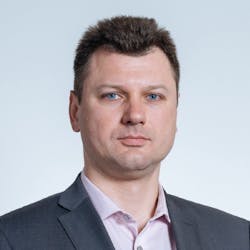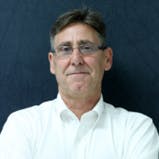Solutions spotlight: Integrating process and turbomachinery control
Transcript
Len Vermillion: Hello everyone. Welcome to this edition of the Control Amplified podcast. I'm Len Vermillion, Editor-In-Chief of Control magazine, and we're about to have a great discussion with our two guests today. John Gracia is a system consultant for DCS at Yokogawa Electric Corporation and Michael Ilchenko is product director at Compressor Controls Corporation.
So why do we have these two gentlemen on together? Well, back in November 2021, CCC and Yokogawa announced the partnership of a jointly developed integrated solution for process and turbo machinery control. It's called CCC Inside. Now, just a couple of months ago, they released enhancements to their solutions with additional function blocks. Historically, CCC was famous for the turbo machinery controls and, of course, Yokogawa for process controls. Now, they bring these two pieces together.
John and Michael are here and they're going to talk about the process of that solution coming together and how it's going to benefit industries such as oil and gas, petrochemical, and chemicals, just to name a few.
Gentlemen, thank you for being with us here today.
Michael Ilchenko: Hello, and thank you, Len. Well, we've recently started seeing a lot more requests and demands from our users to give them an option to apply compressor controls within the DCS. It was happening before as well, but we had our doubts, and it was previously known that DCS controllers were not fast enough, so we had to make some tests and validations and make sure that we can actually provide a high-quality control solution with the DCS control.
We decided since it is possible now and it's technically capable, so why not? After all, we want to deliver our knowledge and expertise to the broader group of customers, so why not? Also, I think if you look at it at a higher level, it probably is a sign of a fundamental change in the technology. We see that DCS controls are now crossing a threshold where they can be used for compressor control.
Well, I have to be honest, not for all applications. There are still some most critical and complex compressors that would still demand some purposely built controls, but a lot of them can be done with a DCS and that's what we're doing.
Vermillion: That's wonderful. Now John, from the Yokogawa point of view, what are Yokogawa DCS customers communicating when the concept of CCC Inside for compressor controls is introduced for DCS? Hope you can speak to that.
John Gracia: Yeah, thank you, Len. I appreciate it. Yeah, we've introduced this as a partnership we've established. We've introduced this across our installed base, which are CENTUM VP users, CENTUM VP's, Yokogawa's Flagship DCS product. So, we've introduced it to users who recognize that having the compressor control as blocks and algorithms already proven from CCC Inside the common engineering environment and operation environments of the DCS flattens their automation curve, and they're also operating in a familiar environment. Engineers are using the function blocks from CCC and just dragging and dropping them into their control drawings just as they would any process control blocks. There's no difference.
So, they recognize that that's very valuable to them. They don't have to know a separate interface or a different engineering environment because it's all integrated into a single DCS. They also like that they can get support because it runs on a Yokogawa product. The field controller is the same. It's just used for compressor control like anti-surge control, things like that, that are dedicated. So, they can call for support just as they would for a DCS issue. Of course, we work closely with CCC on those things, but they really like that aspect of it.
Vermillion: It's a very interesting partnership, and I want to explore a little bit about how we got here. Michael, you can speak to this. How did this partnership get started and I guess what is the basis for that decision to cooperate with Yokogawa specifically?
Ilchenko: Well, indeed we were able to establish quite strong and close relationships. I guess it is obvious that the first thing that we were looking for was very a robust and reliable control platform. But also, it required some corporation on the R&D level from both teams. So, not only some kind of a higher-level marketing agreement, but it is also in fact a very deep R&D partnership. Both companies went a long way improving certain aspects of the algorithms and the software to make it happen and to make it a high-quality product. Yokogawa is very famous of course, on this market. Yokogawa's very innovative and open to this kind of R&D. So, for us, it was an easy choice.
Vermillion: I wonder, John, from the Yokogawa side again, what the choice was there I guess before all this came about? What were your customers doing for compressor anti-surge control before the solution?
Having these blocks in the same engineering environment makes the configuration very familiar to CENTUM VP users on the HMI side. The compressor maps are there, the face plates, the operators know how to operate that. They're just Yokogawa standard face plates, tuning panels are all in there. And the utilities are also integrated. The CCC utilities for tuning the compressor startup are all integrated into the Centum VP system in a single platform. It's very convenient. But before all this, they were using separate dedicated systems. Now, they can have it all in a single system.
Vermillion: Michael, how would that compare to other systems? I mean, with CCC Inside, what are the advantages here compared to what else is out there?
Ilchenko: Well, if you think of it, the decision, what kind of compressor control to use, it kind of has two aspects. One is, of course, the technical perfection and the technical quality of the technical solution. And on the other side, the reorganizational aspect of it, which is the risk assessment. So not only the system has to work at a high level of quality, but also what kind of support customer gets on the way before in the process and after the implementation of the solution.
Thinking about it, CCC is quite long in the business. The company has almost 50 years of history, and I'm pretty sure it'll be around for at least another 50 years. There is no risk that the system would get abandoned, which happened in the past with self-made controls that people were implementing. And on top of that, CCCs focusing on the turbo machinery controls only, and there is literally no other company in the world that will have the same scale and stability and focus on the turbo machinery control at the same time. So, basically, the risk that anything goes wrong with our system is pretty much non-existent and that is important.
Vermillion: Yes, lifecycle support, it is definitely important. Michael alluded to a little bit, John, from your point of view, what is the approach to lifecycle support for Yokogawa here?
Gracia: That's a very important aspect of all this, Yokogawa on the DCS. The CENTUM was introduced in 1975. It's always been called CENTUM. So, there's always a very long lifecycle practice from Yokogawa and their users expect that. They're used to having long lifecycle support. This includes the control stations, all the IO subsystems associated with the CENTUM VP. Since the function blocks are now part of the standard library, they have to go through the same QA validation as new releases of the software come out. They have to be tested the same as the process control blocks. Now, they include the compressor control side of the equation here. So, the same QA validation the software goes through. In addition, as new features are released with new versions of Yokogawa, for example we just released our 6.10. Since the introduction of CCC Inside, which included anti-surge and performance control, the latest release, which was released a few months ago, they released a master control blocks speed control block, extraction control, and communication monitor blocks.
These enhancements now support multi compressor trains, steam turbine control for example. Also, Yokogawa introduced support for both IO subsystems, which are called FIO and NIO. Our users weren't very familiar with those terms, so we also support turbo machinery control modules. But the bottom line is that CCC Inside function blocks used on Yokogawa CENTUM systems are under the same QA testing of minor and major software versions as they're released. And enhancements are added for the hardware. Its customers aren't required to purchase any new systems. It's the same controller or the same field controller that's used on the process control is also used for the compressor control. We don't need any spare parts that are different. Any CPUs, power supplies, they're all the same. It's the same robust operation that's used on the process side, on the compressor side with the CENTUM VP DCS. It's very convenient for customers to depend on the same hardware on both sides.
Vermillion: At this point, I wonder what the plans are for this partnership in the future? How do you see this developing? What's next, Michael?
Ilchenko: We've completed the development stage and now we are starting to make projects and we are improving the cooperation between the engineering teams, but we are also listening to the users. What else we can add or improve? What functions can we work on in the future? So, the product, it gets mature, and I see that both engineering teams are very much enjoying the corporation. I see a very exciting future ahead of us.
Vermillion: John, what's your parting shots here? What do you want people to really know about this solution that they and what they can take away from here today?
Gracia: This solution is fully integrated into the CENTUM. I think it flattens the automation curve. That's what I'd like CENTUM users to understand. Also, since the introduction in November 2021, I've been working very closely with their account managers, co-presenting, going to customer sites, making projects, as Michael said, and look forward to this partnership. It's been very, very easy to work with CCC for us and look forward to the future.
Vermillion: Michael, I'll give you the final word. What's your final takeaway?
Michael Ilchenko: Well, I think this really opens a new page and not only for our companies, but also for the industry. And we see a lot of attention from the users. We see that they appreciate the ability that we are providing now, and we are actually making a lot of demonstrations. So, we have live demos and we show them all the time and people see how convenient it is to have everything in one place, kind of one-stop shop solution. So, I think it is a big advance in the industry.
Vermillion: Michael, John, thank you for being with us here today. And for all of our listeners, I encourage you to check out CCC Inside. And thanks again. We'll talk to you soon.
For more, tune into Control Amplified: The Process Automation Podcast.
About the Author

Control Amplified
The process automation podcast
The Control Amplified Podcast offers in-depth interviews and discussions with industry experts about important topics in the process control and automation field, and goes beyond Control's print and online coverage to explore underlying issues affecting users, system integrators, suppliers and others in these industries.




